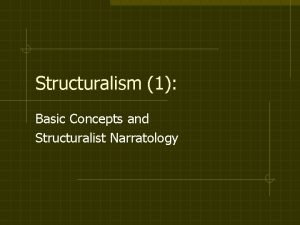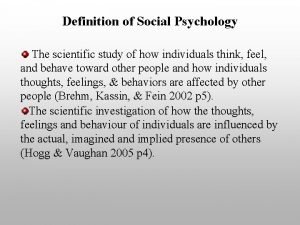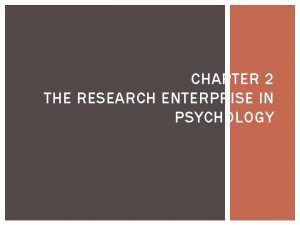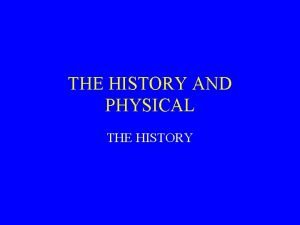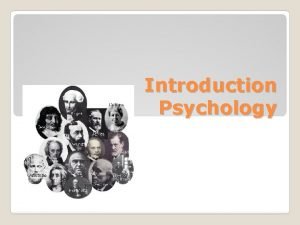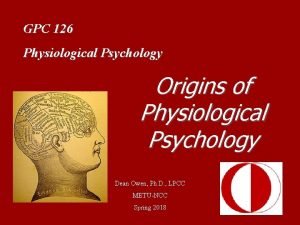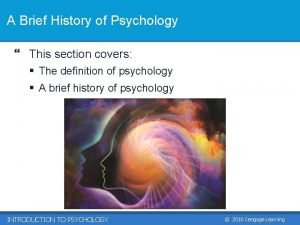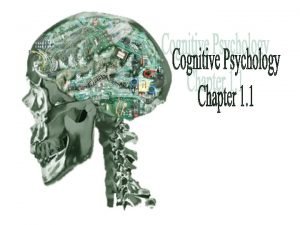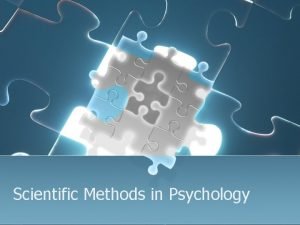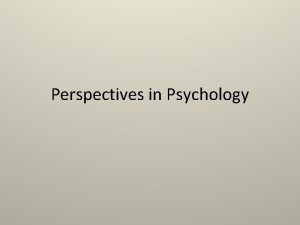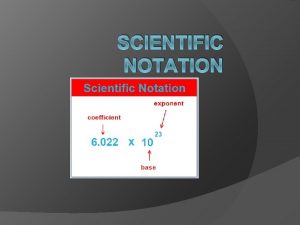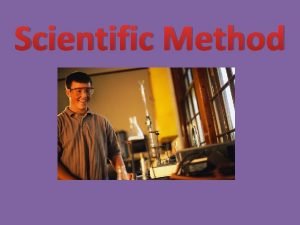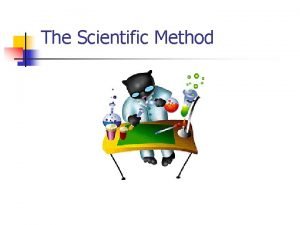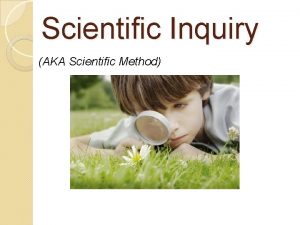PSYCHOLOGY HISTORY What is Psychology Psychology A scientific


















- Slides: 18

PSYCHOLOGY HISTORY

What is Psychology? Psychology – A scientific study of human behavior and mental processes. Etymologically, it came from the Greek words, Psyche which means “soul” or “mind”, and Logos which means “the study of. ”

Definition • Behavior - Any response or activity of an organism. It can either be simple or complex; overt or covert; conscious or unconscious; voluntary or involuntary; rational or irrational.

Goals of Psychology � To Describe � To Explain � To Predict � To Control � They use scientific methods to find answers that are far more valid and legitimate than those resulting from intuition and speculation

Historical Background • Nativist (nature) vs Empiricist (nurture) • Are a person’s characteristics mostly inborn or learned?

History of Psycholog y

Phrenology: Franz Gall (1758 -1828)

BIRTH OF PSYCHOLOGY

Making the body a science • Psychology was not considered an area of study until the 1870’s when the ideas of the industrial revolution were applied to the fields of philosophy and physiology.

Wilhelm Wundt • The German scientist Wilhelm Wundt opened the first laboratory and faculty of Psychology in the University of Leipzig in 1879 and established the first Psychological Journal in 1881. • He was the first to apply the scientific method to the field. • His work focused on consciousness – or the awareness of immediate experience.

Important People in the Dev’t. of Psychology • He created a machine that measured the time lag between people’s hearing a ball hit the platform and their pressing a telegraph key. Wundt has seeking to measure the “atoms of the mind” – the fastest and simplest mental processes.

Important People in the Dev’t. of Psychology Wilhelm Wundt - in his laboratory in Leipzig, Germany

The First Psychologists –E. Bradford Titchener • popularized Wundt’s psychology and brought it to U. S. • used introspection to uncover components of thought • Leading Structuralist

Structuralism vs. Functionalism Split • Structuralists believed that the task of psychology was to analyze consciousness into its basic elements and study how these were related. These elements would include ideas like sensations, emotions, and images. • These investigations were based on introspection by trained subjects. • Introspection – careful, systematic selfobservation of one’s own conscious experience.

William James • Functionalism became popular with the publication of Principles of Psychology in 1890 by William James. • Functionalism is the idea that psychology should focus on the function or purpose of consciousness rather than its structure.

Natural Selection of the mind • Functionalism is heavily based on the work of Charles Darwin and his theory of natural selection. • Natural selection- heritable characteristics that provide an organism with a competitive advantage are more likely to be passed on to the next generation and thus less advantageous characteristics become extinct over generations. • The Functionalists like William James applied this theory to humans. By studying what consciousness does for humans, we can discover how it works.

MODERN PSYCHOLOGY

Modern Psychology Views https: //www. youtube. com/watch? v=j. Txpv. Rs. C 4 H 0
 Scientific inquiry vs scientific method
Scientific inquiry vs scientific method How is a scientific law different from a scientific theory?
How is a scientific law different from a scientific theory? Scientific revolution ap world history
Scientific revolution ap world history History of the scientific method
History of the scientific method What is psychology
What is psychology Structuralist narratology
Structuralist narratology Social psychology is the scientific study of:
Social psychology is the scientific study of: Vce psychology scientific poster
Vce psychology scientific poster Goals of psychological enterprise
Goals of psychological enterprise Also history physical
Also history physical What is psychology
What is psychology Scientists have to
Scientists have to Emphasis
Emphasis Famous forensic psychologists
Famous forensic psychologists History of cognitive psychology
History of cognitive psychology Brief history of psychology
Brief history of psychology History of cognitive psychology
History of cognitive psychology History of sport psychology
History of sport psychology Sejarah perkembangan psikologi eksperimen
Sejarah perkembangan psikologi eksperimen





